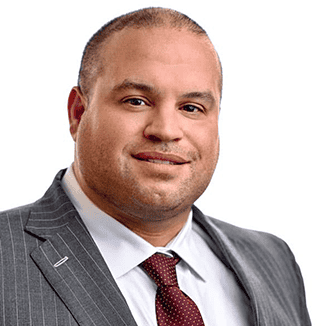
After a car accident in Maryland, one of the first people to contact you may be an insurance adjuster. They might sound helpful, but their job is to protect the insurance company—not you.
Whether the accident involved a traditional vehicle or advanced technology like a self-driving car, adjusters are trained to minimize payouts and protect their employer’s bottom line.
When dealing with insurance adjusters after a car accident in Maryland, you should never admit fault, avoid accepting low-ball offers, and above all, contact a Baltimore car accident lawyer for representation.
How Insurance Adjusters Trick You — And What You Can Do About It
If you’ve been hurt in a car accident in Maryland, you may soon hear from an insurance adjuster. They might sound friendly, but their job is to save their company money — not to help you.
At The Bishop Law Group, we help injury victims stand up to insurance companies and get the compensation they deserve.
What Is an Insurance Adjuster?
An insurance adjuster works for an insurance company. Their job is to:
- Investigate your claim
- Review your medical records
- Offer you a settlement — often much lower than what you deserve
In Maryland, insurance companies follow an at–fault system, meaning the person who caused the accident must pay for the damages. But Maryland also uses contributory negligence, which means if you are even 1% at fault, you may not get any compensation. Adjusters know this and may try to use it against you.
For a free legal consultation, call (410) 390-3101
Common Tricks Insurance Adjusters Use
Some of the most common tricks that insurance adjusters in Maryland employ include:
The “Nice” Call That Isn’t Really Nice
After your accident, an adjuster may call and say they’re “sorry.” But this isn’t a real apology. They won’t admit fault or offer fair compensation. Studies show that hearing “I’m sorry” can make people settle for less. Be polite, but don’t let kind words fool you.
Asking for a Recorded Statement
Adjusters often ask for a recorded statement. This may seem harmless, but they may use your words against you. Even saying “I’m sorry” could be twisted into admitting fault. In Maryland, you are not required to give a recorded statement. Always speak with a lawyer first.
Requesting Full Access to Your Medical Records
You do not have to give the insurance company access to your full medical history. They may use old injuries to deny your claim. A lawyer can help you share only the records that matter.
Blaming Your Injuries on Pre-Existing Conditions
If you had a past injury, adjusters may say your current pain isn’t from the accident. But Maryland law protects you. If the accident made your condition worse, you can still get compensation. This is called the “eggshell plaintiff” rule, and it means the insurance company must take you as you are.
Delaying Your Claim
Some adjusters will stop returning calls or slow down the process. They hope you’ll get tired and accept a low offer. At The Bishop Law Group, we don’t let that happen. If they won’t negotiate, we will take them to court.
Saying You Don’t Need a Lawyer
Adjusters may tell you not to hire a lawyer. Why? Because they know a lawyer will fight for more money. In fact, people who hire lawyers often get three times more than those who don’t. And at our firm, you don’t pay unless we win your case.
Maryland Injury Statistics
- In 2023, Maryland had over 100,000 car crashes, with more than 30,000 injuries reported
- Insurance companies paid out $1.2 billion in auto claims statewide — but many victims received far less than they deserved
- Maryland’s contributory negligence law is one of the strictest in the country, making legal help even more important
Click to contact our lawyers today
Know Your Rights. Protect Your Claim.
After a car accident in Maryland, one of the first calls you’ll receive may be from an insurance adjuster. They work for the insurance company—not for you.
Their job is to investigate your claim and try to settle it for as little money as possible. That’s why it’s important to know how to handle these conversations carefully.
Complete a Free Case Evaluation form now
What Is an Insurance Adjuster?
An insurance adjuster is assigned to your case shortly after you report the accident. They may ask for a recorded statement or request access to your medical records. While they may sound friendly, their goal is to protect the insurance company’s bottom line.
Maryland follows a strict legal rule called contributory negligence. If you are found even 1% at fault for the accident, you may not receive any compensation. Insurance adjusters know this and may try to use your words against you.
Seven Tips for Speaking with an Insurance Adjuster
To make it simple, let’s cover some of the best tips for dealing with insurance adjusters after a car accident in Maryland:
Contact a Personal Injury Lawyer First
The most effective way to protect your rights after a car accident is to speak with an experienced Maryland personal injury attorney at The Bishop Law Group. Our legal team handles all communication with insurance adjusters, prepares you for any necessary conversations, and ensures your claim is positioned for success.
Stay Calm and Polite
It’s normal to feel upset after an accident, but losing your temper won’t help your case. Speak clearly, stay calm, and be respectful—even if the adjuster is difficult.
Stick to the Facts
Only share what you know for sure. Don’t guess or make assumptions. If you’re unsure about something, say so. Incorrect or unclear statements can be used to question your credibility.
Never Admit Fault
Avoid saying things like “I’m sorry” or “I should have seen it.” These statements can be taken as admissions of fault and may hurt your claim under Maryland’s contributory negligence law.
Decline to Give a Recorded Statement
You are not required to give a recorded statement. These recordings are often used to find inconsistencies or mistakes that can be used against you. Always speak with your attorney before agreeing to any recording.
Do Not Sign a Blanket Medical Release
Insurance adjusters may ask for full access to your medical history. You should only share records that are relevant to your claim. A lawyer can help you decide what to release and protect your privacy.
Take Notes and Ask Questions
Keep a record of your conversations. If the adjuster makes a claim or offers a settlement, ask how they reached that decision. Understanding their reasoning can help your lawyer build a stronger case.
Why Recorded Statements Can Hurt Your Case
Insurance adjusters often use recorded statements to deny or reduce claims. If you forget to mention a symptom or make a small mistake, they may argue that your injury isn’t real or that you’re being dishonest.
After an accident, you may be in pain, on medication, or simply overwhelmed. These factors can affect your memory and make it easy to say something that could be used against you later. That’s why it’s best to avoid recorded statements unless your attorney is present.
What if the Adjuster Is from Your Own Insurance Company?
Even your own insurance company may not be on your side. If the at-fault driver doesn’t have enough coverage, you may need to file a claim under your uninsured/underinsured motorist (UI/UIM) policy.
But once you file a claim, your insurer becomes an adversary. They may try to minimize your payout just like any other company.
Let The Bishop Law Group Handle the Insurance Company
At The Bishop Law Group, we take over all communication with insurance adjusters so you don’t have to. From managing paperwork and meeting deadlines to negotiating for full and fair compensation, our team is here to protect your rights every step of the way.
You don’t have to face the insurance company alone. Contact us today for a free consultation.
Call or text (410) 390-3101 or complete a Free Case Evaluation form

